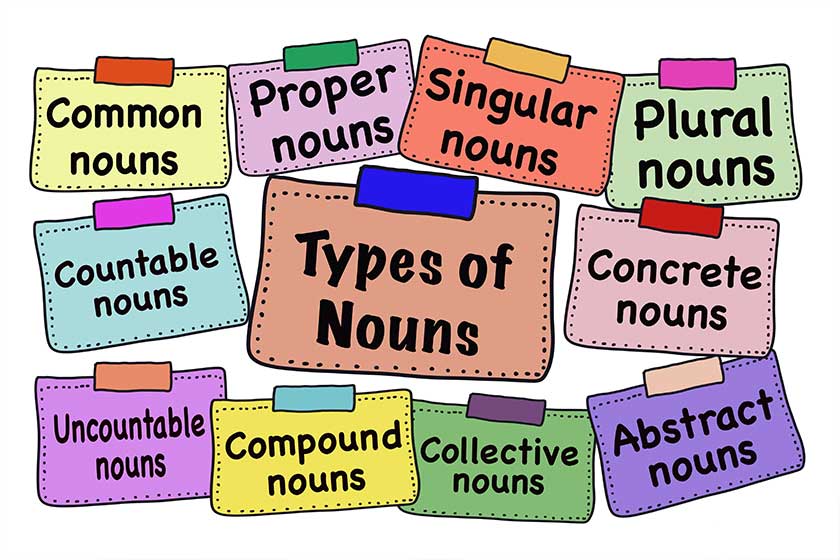
Nouns are the foundation of any language, and in English, they serve an important role in forming meaningful sentences. Types of nouns in English grammar can be varied, ranging from the simplest to more complex forms. These categories help define how we communicate and identify people, places, things, or ideas. By understanding the different types of nouns in English grammar, students gain a stronger grasp of sentence structure, allowing them to express themselves more clearly and accurately. This knowledge becomes key as they advance in their language development, forming a core part of their learning journey.
Common Types of Nouns in the English Language
In English, nouns are classified into several distinct categories. These categories help define their specific role within sentences.
- Common nouns, like “dog” or “city,” refer to general things, places, or animals.
- Proper nouns, such as “London” or “Michael,” are specific names of people or places.
- Countable nouns can be quantified, like “apple” or “book”.
- Uncountable nouns such as “water” or “sugar” cannot be quantified.
By recognizing these different noun types, students improve their understanding of how nouns interact with verbs and other sentence elements. This allows for more precise language use, which is key to both speaking and writing effectively.
Proper Nouns and Their Importance in English
Proper nouns are a specific subset of nouns that refer to particular people, places, or things. These nouns are always capitalized to signify their distinct nature. For example, “Alice” is a proper noun because it refers to a specific person, while “girl” is a common noun. The importance of proper nouns lies in their ability to specify unique entities. Without proper nouns, it would be difficult to distinguish one individual or place from another. Recognizing and using proper nouns correctly is a key skill in English grammar, ensuring clarity and accuracy in communication.
Common Nouns and Their Usage
Common nouns are words that identify general categories of people, places, or objects, rather than specific names. Unlike proper nouns, which refer to unique entities and are capitalized, common nouns remain lowercase unless they appear at the start of a sentence. Examples include “car,” “school,” and “tree.” These nouns are flexible, and able to describe a variety of items or concepts. While they don’t refer to individual entities, common nouns are essential in language, serving as the building blocks of clear communication and helping to convey broad ideas and general meanings.
Abstract Nouns and Their Meaning
Abstract nouns represent intangible concepts or ideas that cannot be touched or seen. These include emotions, qualities, and conditions such as “happiness,” “freedom,” or “intelligence.” Unlike physical nouns, abstract nouns refer to things that exist only in thought or feeling. While abstract nouns are difficult to describe with concrete examples, they play a critical role in expressing complex ideas.
Collective Nouns and Their Role in Grammar
Collective nouns refer to groups or collections of people, animals, or things considered as a single entity. Examples include “team,” “family,” and “flock.” While collective nouns represent multiple individuals, they are treated as singular when used in sentences. For instance, “The team is practicing.” Understanding collective nouns helps clarify how groups function in language. It ensures that subjects and verbs agree, even when referring to a group as a whole. Properly using collective nouns strengthens grammatical accuracy and coherence in communication.
Countable Nouns Versus Uncountable Nouns Explained
Countable nouns refer to objects or things that can be counted, such as “apple” or “book.” They have both singular and plural forms, allowing for easy quantification. For instance, you can say “two apples” or “three books.” Uncountable nouns, however, cannot be counted directly. These include things like “water,” “sugar,” and “air.” Uncountable nouns are typically treated as singular, and measuring quantities requires specific units, such as “a cup of water” or “a slice of bread.” Recognizing the difference between countable and uncountable nouns is important for using articles and quantifiers correctly.
Possessive Nouns and Their Correct Usage
Possessive nouns show ownership or a relationship between two entities. For example, in the phrase “Tom’s car,” the possessive noun “Tom’s” indicates that the car belongs to Tom. To form possessive nouns, you typically add an apostrophe and “s” to a singular noun, and just an apostrophe to plural nouns that end in “s.” Correctly using possessive nouns is important for conveying ownership clearly and avoiding confusion. This grammatical structure helps specify relationships, making language more precise and effective.
Compound Nouns and How to Use Them
Compound nouns are formed by combining two or more words to create a new noun. For instance, “toothbrush,” “basketball,” and “sunflower” are compound nouns made by combining simpler words. These nouns are commonly used to describe specific items, actions, or ideas in a concise manner. When using compound nouns, it is important to understand whether the combined words should be written as one word, two words, or hyphenated. Proper usage of compound nouns allows for clearer communication and more efficient sentence construction.
Build Strong Grammar Skills with NFC Academy’s Elementary Homeschool Programs
At NFC Academy, our accredited elementary programs for Kindergarten through 5th grade focus on building a solid foundation in grammar, including understanding types of nouns. Through engaging lessons, students learn about common, proper, abstract, and other noun types, enhancing their language comprehension and communication skills.
Our structured curriculum combines interactive activities with phonics, reading, and writing to ensure students grasp grammar concepts effectively. With support from NFC Academy teachers or parents, children develop the skills needed for confident language use. Enroll today to give your child a strong start in mastering English grammar!



